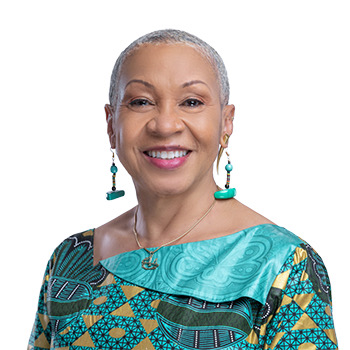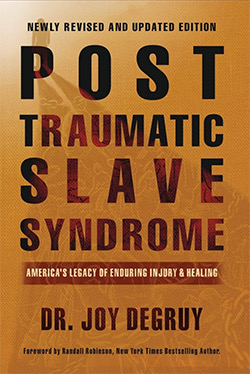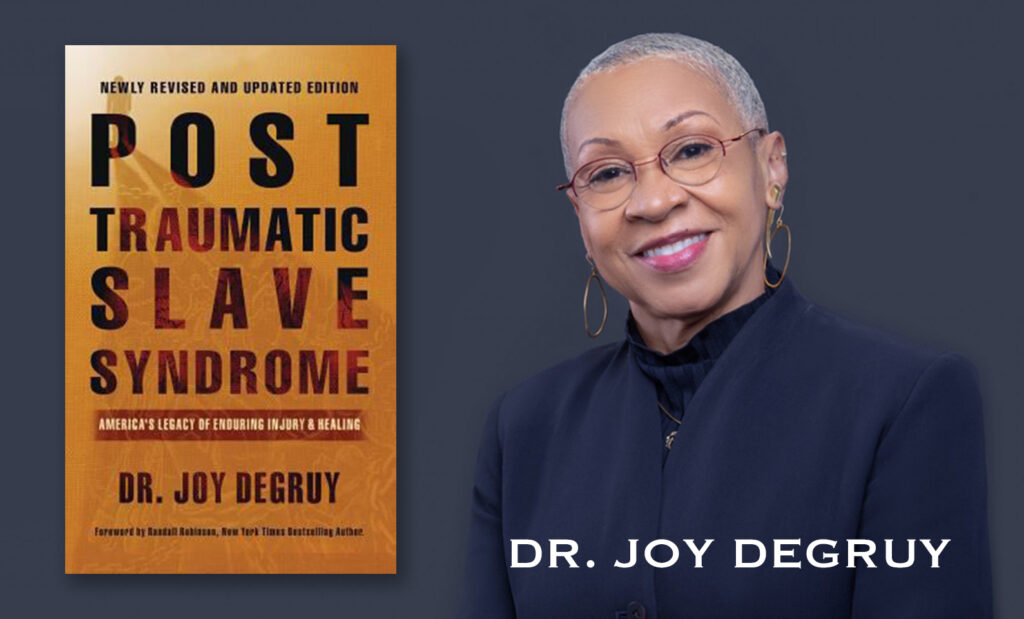
About the Author
Dr. Joy DeGruy’s Post Traumatic Slave Syndrome: America’s Legacy of Enduring Injury and Healing, published in 2005, examines the long-term psychological and emotional effects of slavery, racism, and systemic oppression on so called “African American” communities.
In her book she introduces and explores the concept of Post Traumatic Slave Syndrome (PTSS), arguing that the trauma of slavery has been passed down from generation to generation, influencing behaviors, self-perception, and social dynamics among “Black” Americans today.
Dr. Joy Angela DeGruy was born in 1953 and raised in a working-class family. She experienced racism and poverty firsthand during her childhood, which later influenced her research on intergenerational trauma. Her academic achievements include a Bachelor’s degree in Communication, Master’s in Social Work, and Clinical Psychology (Portland State University), and a Ph.D. in Social Work Research (Portland State University, 2005), and she is the President and Chief Executive Officer of Joy DeGruy Publications Inc.
Beyond academia, DeGruy is a prominent public intellectual, delivering influential lectures at universities, TED Talks, and international conferences, while also appearing in documentaries like PBS’s The African Americans: Many Rivers to Cross. Her contributions have earned widespread recognition, including the 2017 Martin Luther King Jr. Memorial Award for social justice advocacy and an honor from the Oregon Senate for advancing equity in education.
Dr. DeGruy’s research focuses on the enduring psychological effects of slavery and institutional racism on African American communities, emphasizing the need for culturally informed mental health interventions.
Post Traumatic Slave Syndrome

Dr. Joy DeGruy’s book centers around four key arguments. First, she defines Post Traumatic Slave Syndrome (PTSS) as a condition rooted in multigenerational trauma caused by centuries of chattel slavery and sustained through institutionalized racism, such as Jim Crow laws and mass incarceration.
Unlike PTSD, which arises from individual trauma, PTSS is collective and historical in nature. Second, DeGruy identifies three key behavioral patterns in African American communities that stem from this trauma: Vacant Esteem (low self-worth due to internalized racism), Marked Propensity for Anger & Violence (survival responses to oppression), and Racist Socialization & Internalized Racism (learned behaviors that reinforce racial hierarchies).
Third, her historical and psychological analysis explores how slavery’s brutal conditioning—including family separation, dehumanization, and sexual violence—created adaptive behaviors that persist today, while systemic racism continues to perpetuate these traumas through education, media, and economic disparities.
Finally, DeGruy offers pathways to healing, emphasizing the importance of acknowledging historical trauma, fostering community empowerment, and implementing culturally relevant mental health interventions.
Critical Analysis
Strengths & Contributions
Dr. Joy DeGruy’s pioneering work on Post Traumatic Slave Syndrome (PTSS) has reshaped conversations around intergenerational trauma, offering a critical framework to understand mental health disparities within Black communities. Her holistic approach bridges history, psychology, and sociology, revealing how centuries of systemic oppression manifest in modern challenges—from cycles of violence and poverty to disrupted family structures. Beyond analysis, DeGruy advocates for healing-centered solutions, championing cultural pride, trauma-informed therapy, and transformative education as pathways to resilience and collective recovery.
Criticisms & Limitations
While Dr. DeGruy’s Post Traumatic Slave Syndrome has been influential, it has faced scholarly critiques. Some researchers question its empirical rigor, noting its absence from the DSM and reliance on historical analysis rather than large-scale clinical studies. Others argue the framework risks overgeneralizing Black experiences by not fully accounting for intra-community diversity—such as differences among immigrants, multiracial individuals, or across socioeconomic strata. Additional criticism suggests an imbalance in focus, with PTSS emphasizing trauma pathology while underdeveloped in documenting Black resilience and adaptive strengths cultivated through oppression. Comparative analyses also emerge, as scholars debate whether PTSS meaningfully differs from other historical trauma frameworks (e.g., Native American or Holocaust trauma theories). These critiques highlight ongoing academic conversations about how best to theorize transgenerational oppression without reducing complex lived experiences.
Legacy
Dr. DeGruy’s Post Traumatic Slave Syndrome framework has had significant real-world applications, particularly in shaping trauma-informed approaches within social work and therapeutic practices serving African American communities. Beyond clinical settings, PTSS has become an important educational tool, informing university curricula, professional workshops, and community dialogues about the enduring psychological consequences of systemic racism. The theory has also generated broader societal debates, fueling conversations about historical accountability, reparative justice, and how institutions might meaningfully address centuries of racial trauma. While not without its critics, PTSS continues to influence both scholarly discourse and practical interventions at the intersection of mental health and racial equity.
Dr. Joy DeGruy Leary: Post Traumatic Slave Disorder
References
- DeGruy, J. (2005). Post Traumatic Slave Syndrome: America’s Legacy of Enduring Injury and Healing. Joy DeGruy Publications.
- American Psychological Association (APA). (2021). Racial Trauma and Mental Health. https://www.apa.org
- Leary, J. D. (2005). Post Traumatic Slave Syndrome: A Review. Journal of African American Studies, 9(3), 17–38.
- DeGruy, J. (2005). Post Traumatic Slave Syndrome. Joy DeGruy Publications.
- Portland State University. (n.d.). Faculty Profile: Dr. Joy DeGruy. Retrieved from https://www.pdx.edu
- TEDx Talks. (2012). Dr. Joy DeGruy: Post Traumatic Slave Syndrome. [YouTube Video]. Retrieved from https://www.youtube.com
- The Skanner News. (2018). Oregon Senate Honors Dr. Joy DeGruy. Retrieved from https://www.theskanner.com
You can learn more about Dr. Joy DeGruy and her work by visiting her website: https://www.joydegruy.com




